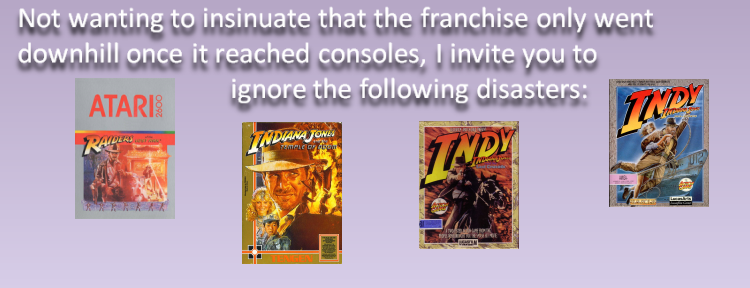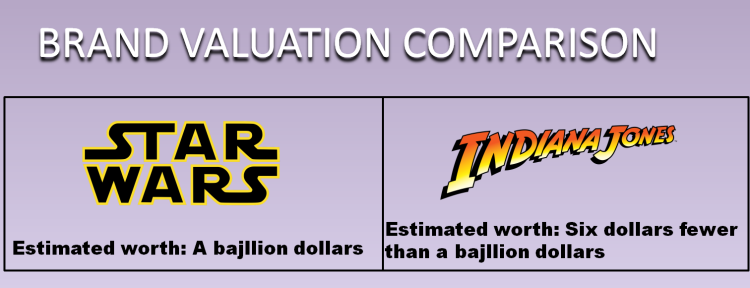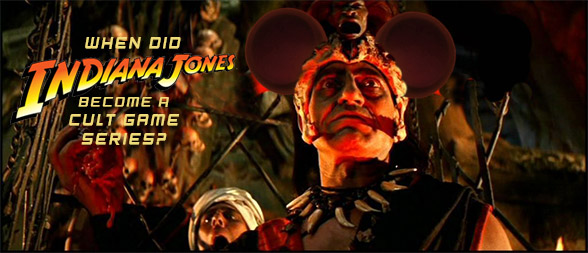I am but the simple son of a cane farmer, so I'm afraid you are going to have to walk me through the arithmetic here: Just how in the blue hell did Indiana Jones become an underdog in the video game world?

Do I indulge in hyperbole? Here is one of the most celebrated, high-grossing adventure film series of all time, a game changer for the action genre, the direct inspiration for Tomb Raider and the indirect inspiration for more video games than could ever be enumerated, and what you're telling me is that in the past TEN YEARS, which saw a new theatrical installment, the universally beloved license, one which common sense dictates would fit the interactive space like a glove, has been exploited in the following manner:
- Indiana Jones and the Emperor's Tomb (2003)
- Indiana Jones and the Staff of Kings (2009)
So, okay, we've had the LEGO Indiana Jones games, which were good fun and which I don't want to come across as dismissive of, but am I the only one scratching my scalp here? Indiana Jones is a no-brainer for video game exploitation, yet from the low volume and tepid quality of LEC's overall output, you'd think The Radioland Murders was the property fans were asking them to spare the occasional greenlight.
Granted, there are the usual behind-the-scenes kerfuffles to consider before embracing the tempting conclusion of: proactive idiocy on the part of everyone involved. One is that, following Emperor's Tomb, The Collective was keen to helm an immediate follow-up, so much so that they translated that eagerness into a running prototype. Unfortunately, LEC was undergoing one of its world famous transitions at the time, and passed on the pitch in favor of being themselves.

Similarly, Staff of Kings, which began its internal development way earlier and was a project conceived far more ambitious than the eventual released product suggests, languished in the custody of a company in perpetual management flux. Choosing ultimately to devote its resources to Star Wars: The Force Unleashed, LucasArts malnourished its internal Indy title before finally cancelling it altogether, leaving the versions developed by third parties for lower-end platforms, spinoff experiences bounded by dramatically reduced provision, to reach store shelves.
Even in the days when the studio was more regularly committed to the character, though, it's fair to say that they never got him exactly right. That Indiana Jones and the Fate of Atlantis is his greatest video game excursion is not an uncommon opinion around these parts, but surely even the most rabid adventure gamers among us can't help but ask: how is that possible?
Indiana Jones should be a perfect fit for an action/adventure title, and to be sure both Infernal Machine and Emperor's Tomb are respectable ventures, with Staff of Kings for the Wii being a qualified diversion. But why are they the only examples that a decade has to show for itself, and why must they ironically feel like nebbish mimes of Tomb Raider and Uncharted when the pedigree they squander is what INSPIRED THOSE GAMES IN THE FIRST PLACE.
As far as I'm concerned, the best Indiana Jones video games to date are a brace of point 'n click adventures and a Super NES sidescroller. There's nothing wrong with that, but there's certainly something odd with that.
There are theories one can probe as to why the franchise has never really soared after peaking so unbelievable early, but none of them truly explain the baffling extent to which Indy has been sidelined over the years. I say "extent" because it is an unassailable truth that Star Wars is a more lucrative brand than Indy, but as an all-purpose rationale for the aggressive dormancy fans have endured it rings pretty hollow.

If Indiana Jones (TM) being the less absolute of two folding money Xerox machines is what it all comes down, though, that is quite instructive when taking on the challenge of interpreting the business decisions LucasArts was making right up to the end. I mean, in an environment where the line of thinking is that Indiana Jones is not viable enough to risk more than one (often outsourced) production every five years, it makes us all the more adorable for thinking that the original IPs stood any kind of a chance.
It's a familiar tragedy that there were studios that would have killed to be anointed with the right to develop for a license like Indy while its actual custodians chose to neglect it. A clarifying statistic: the last time an Indiana Jones game developed under the LucasArts roof actually shipped was 1999. No matter how you slice it, no matter how much "context" you introduce to justify it, that is an F-minus. A zero out of ten. There really are no excuses.
But beating up on a company that no longer exists for past decisions is a delight with precious little utility. Recent circumstances force us to consider the game franchise's future, which is brighter if by default. Will Disney see the glaring potential here, or will this be another case of the size of the holding company and the fail-safe Star Wars brand rendering Indy too relatively negligible (!!!) a cash cow to pay much mind?

The good news is they don’t have to. As with Star Wars, there is reason to think that Disney's strategy to license out LucasArts properties from here on out will lead to some good games, and it’s compelling to consider who would be the best folks to do the license justice. With Telltale continuing to perfect the marriage between narrative and interactivity, they’d be an inspired candidate for taking Indy on another story-driven outing.
Alternatively, there must be a throng of respected action/adventure builders who would jump at the chance of playing in the Indy sandbox and proving the frankly outstanding theory that the excellence of a full-stop 3D epic is practically self-evident.
What do you, the archeologists at home, have to say on the matter? What would your ideal Indy game look and play like? Is it not weird that we’ve had as hard a time getting an Indiana Jones game made as we have with Monkey Island? Swallow that laugh - the math backs me up more than you think.
